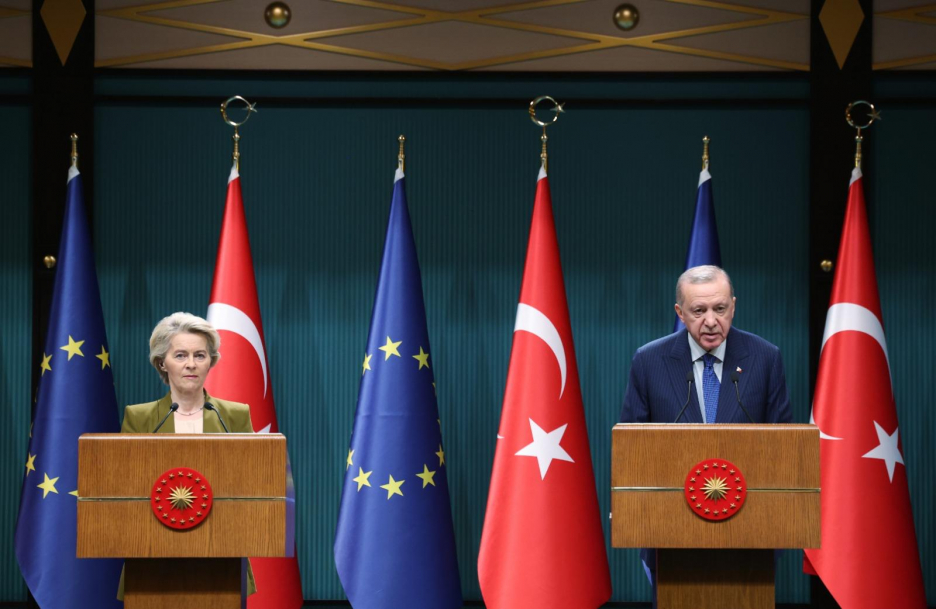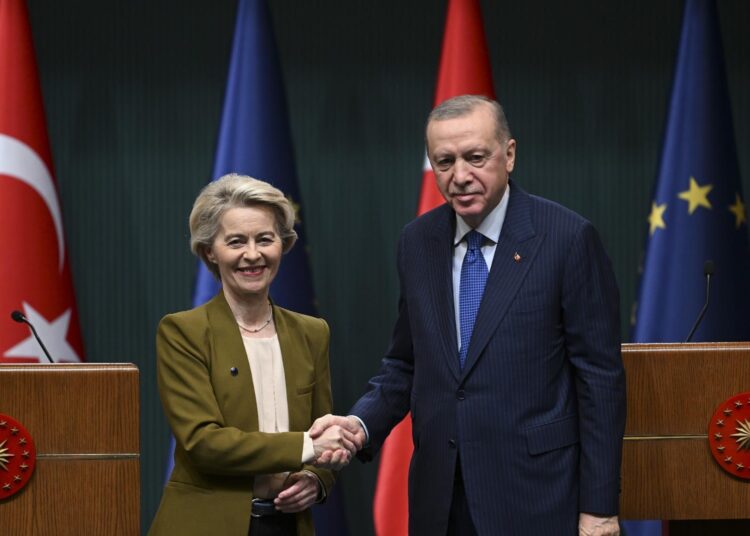Levent Kenez/Stockholm
Turkey has been allocated more than 24 billion euros in grants and humanitarian aid from the European Union since 2002, but the long-term goal of aligning the country with European democratic standards remains elusive. The EU continues to provide substantial funds to contain refugee flows while refraining from openly challenging Ankara’s domestic practices, effectively prioritizing migration management over democratic reform.
According to data presented to the Turkish Parliament’s EU Harmonization Committee on October 15, senior foreign ministry officials admitted that while financial cooperation continues uninterrupted, political reforms have stalled and transparency over how EU funds are spent has sharply declined.
Deputy Foreign Minister and EU Affairs Chair Mehmet Kemal Bozay told lawmakers that the financial and technical cooperation between Turkey and the EU remains “functional and operational despite political stagnation.” He described a new phase of cooperation focused on technology, connectivity and energy rather than democracy and human rights. “We are adapting our national action plan to align with EU strategies on digitalization and sustainability,” Bozay said. “Our approach is to harmonize as if we will join tomorrow while maintaining competitiveness as if membership will take a long time.”
According to Bülent Özcan, director general for financial cooperation at the Foreign Ministry’s EU Directorate, Turkey has received more than 10 billion euros in pre-accession assistance (IPA) funds and has been allocated 12.3 billion euros for migration management and humanitarian aid for the period up to 2027. The total amount of direct EU support to Turkey, including education and civil-society programs, will exceed 24 billion euros by 2027.
Of this, 9 billion euros was allocated in the first three IPA cycles covering 2002–2020, while the ongoing 2021–2027 phase provides only 1.2 billion euros, a dramatic reduction reflecting strained relations and EU concerns over rule-of-law backsliding. The funds are being used for projects ranging from rural development and digital infrastructure to transportation, agriculture and municipal waste management.
The EU also approved a 2.4 billion euro credit facility for Turkey, designed to stimulate private investment and green transformation, including 400 million euros for municipalities in earthquake-stricken regions. An additional 400 million euros in direct budgetary support was transferred in 2024 to offset government spending on earthquake reconstruction in Kahramanmaraş and Hatay provinces.
Minutes of the parliamentary committee meeting on October 15 in Ankara:
“Nearly 50 prefabricated schools, six hospitals, various municipal water and waste projects and work on cultural restoration was financed through this package,” Özcan told the committee. “The EU reimbursed Turkey for eligible expenditures already made from the national budget.”
Despite years of EU funding and political engagement, efforts to strengthen democracy and promote European values in Turkey have fallen short. Democratic institutions have weakened, civil society struggles under pressure and political polarization continues to deepen.
Bozay characterized Ankara’s relationship with Brussels as increasingly pragmatic. “Technology now drives foreign policy more than diplomacy does,” he said, highlighting cooperation in artificial intelligence, digital transition and supply-chain security. He claimed that while accession chapters remain blocked due to Cyprus and political disputes, Turkey and the EU are “working together in the digital and defense spheres.”
Yet independent observers note that this technocratic framing masks a deeper political retreat. EU grants once meant to advance the rule of law have instead sustained a government that routinely undermines judicial independence and silences dissent.
The European Commission’s own assessments support this paradox. Between 2014 and 2020, when 3.5 billion euros in IPA funds were allocated for democracy, governance and human rights, Turkey fell sharply in every major index measuring freedom and judicial independence.
European Union aid intended to strengthen Turkish civil society and democratic participation appears to have taken a very different path. According to documents reviewed by independent monitors, millions of euros in EU-funded programs, particularly under the Erasmus+ initiative, have been quietly redirected to pro-government organizations that promote Islamist ideology and maintain close ties to the administration of President Recep Tayyip Erdogan.
At the center of the controversy is the Turkish National Agency, the body responsible for managing Erasmus+ allocations in Turkey. The agency operates under the foreign ministry’s Directorate for EU Affairs and is currently headed by Ilker Astarcı, a former adviser to Erdogan who once oversaw public relations and media strategy at the presidential palace. Under his leadership a growing share of EU education and youth funds has been steered toward groups with political or religious agendas rather than independent civic initiatives.
One such recipient was the Foundation for Human Rights and Freedoms and Humanitarian Relief (İHH), which the United Nations has cited for alleged weapons trafficking to jihadist groups in Syria. In 2023 the foundation received an EU grant for what was described as an adult training project. Several other Islamist entities with long-standing government connections benefited in similar ways, including associations that represent graduates of religious schools and business networks that openly endorse Erdogan’s political platform.
These organizations, many of which play a central role in advancing the ruling party’s social and ideological outreach, have increasingly replaced independent NGOs that once partnered with the EU to promote transparency, gender equality and freedom of expression. The shift reflects a broader pattern: As Ankara tightened control over civil society, the distribution of European funds mirrored the government’s own priorities.
The Erasmus+ program, which has a total budget of 26.2 billion euros across Europe for the 2021–2027 period, was designed to promote education, mobility and intercultural understanding. In Turkey, however, much of its spending has gravitated toward foundations and associations aligned with the government’s Islamist agenda. Among them are entities running religious schools, state-affiliated think tanks and even the country’s public broadcaster — all institutions accused by rights groups of fueling nationalist and sectarian rhetoric.

According to figures presented to lawmakers, Turkey has received more than 10 billion euros in migration-related assistance from the European Union since 2016. The funding, primarily directed through the Facility for Refugees in Turkey (FRIT) and complementary humanitarian programs, was designed to support the country’s efforts to host nearly 4 million Syrians and other migrants who remain on Turkish soil.
Özcan explained that these resources are separate from pre-accession assistance and are distributed under humanitarian and social stabilization frameworks. “Migration cooperation continues to function efficiently,” he told the committee, emphasizing that most projects are implemented through international organizations and jointly monitored by Turkish and European institutions.
However, the political dimension of this cooperation remains contentious. Opposition lawmakers frequently criticize the government’s approach, arguing that Ankara has effectively accepted the role of Europe’s migration buffer in exchange for continued financial support. They accuse the administration of turning Turkey into a refugee holding zone claiming that the EU prefers to outsource its border policy to Turkey while avoiding confrontation over democratic decline and human rights violations.
This perception is echoed by many across Turkish society, who believe the migration deal has produced a relationship of mutual silence. The EU continues to provide substantial funds to contain refugee flows while refraining from openly challenging Ankara’s domestic practices.












